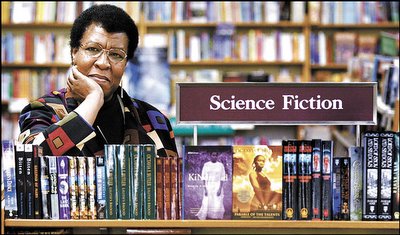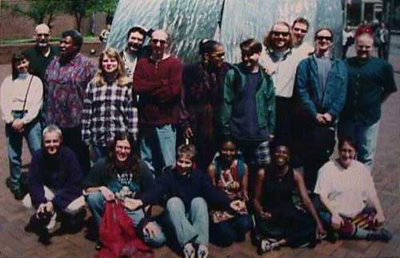Swingin' at Swann Galleries
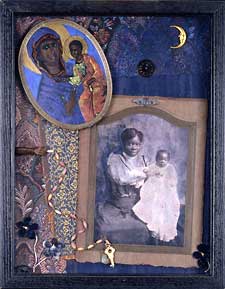
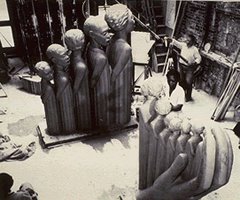
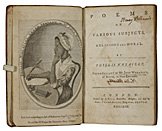
The Harp by Augusta Savage
signed Phyllis Wheatley volume - one of her letters set a record, selling for $253K @ Swann
The first time I attended an auction was two years ago, when I met independent collector and curator, Gene Peters of Sankofa Exhibit Consultants, at an Octavia Butler booksigning at the Schomburg. Octavia was there to celebrate the 25th anniversary of her novel, Kindred. Gene was throwin' shade because I didn't have no business cards on me and his were mint. Conversation turned to art, and I soon had my calendar marked for the annual Printed and Manuscript African Americana sale at Swann Galleries. Now if you don't know, this ain't no Aunt Jemima cast iron bank sale. You won't leave there feeling like you been bamboozled with Darkie Toothpaste (they still sell this stuff in Japan and Brazil) or the Coon Chicken Inn ashtrays. I'm talkin' rare, rare good stuff, cultural items and historic artifacts that really should be preserved and studied, always.
The gallery is located near Baruch College and the annual sale (this year was the tenth) is organized by Wyatt Day. He's a smallish man, low to the ground, with friendly eyes and snappy clothes. He also carries himself like someone you might trust, if you had to, with your family's legacies. I liked Wyatt instantly when we were introduced, he just has a warm and open aura about him. Yeah, I suspect that's part of his job, but the Swann Galleries African Americana sale isn't stuffy like Christie's. I forget Wyatt's official title, but he's associated with Harvard, I think, and has a shop in Nyack. Let's just say, he's got it goin' on. More than a few folk commented that they'd love to have his day job. And over the past ten years, the word has definitely gotten out. I heard an art collector at SMH say that the Wall Street Journal has let the cat out of the bag in their recent article, but sharp folk like Gene and n'em been knowin'. That first time I went, I was just glad I could tag along.
That afternoon I was excited about the auction, and yes, a little anxious. We've all seen the comedies where someone in the audience scratches an ear and learns that they've just bid on a five-figure rare artifact they don't want and can't afford. Well, the lots at Swann are diverse and broad. I mean really, there is all kinda stuff that would interest damn near anyone who loves art, loves music, loves literature, loves history. And I was pleasantly surprised to find that even someone with a modest budget could come away with a wonderful item, whether it's a signed copy of a Sun Ra poster, a pair of 1920s handmade ragdolls, or a daguerrotype of 'an unknown well-dress black gentleman.'
It's the unknown material that I found myself most interested in during my first visit, all the old photographs of someone's daughter, mother, husband, sister, wife, child. Black folk with faces that still haunt you after all these years. The sepia-toned treasures you find in your bigmama's photo album, the one she got way back in that chiffarobe. Well, at the February 23rd preview, co-sponsored by the good sistas at MoCADA, I'd spied those little dolls, and not because I'd planned to purchase them or anything, but because I have a similar one at home. Now, mine wasn't passed on to me by a loving elder, or discovered in an off-the-map rural town, but online at Ebay, back around the time when the company first started and before it was a household name. I wasn't particularly savvy about this purchase, just knew it was unusual and it spoke to me. Thought my firstborn would like her but she didn't, so Lil Miss stays with me. She's probably watchin' my back right now as I type, sitting on a shelf, shakin' them lil plaits on her wobbly head.
A few days later, I learned just what a score she was, after someone snatched that male and female pair of dolls, with their faded, stained handmade clothes and neatly stitched limbs, for about $350 at the Swann auction on February 28th. Now, this brother (forever known by one who shall remain nameless as FRE...) had been buying black treasures left and right, so much that we thought he may have been purchasing for an institution. Bu no, he told us proudly, he was a private collector. "Oh, so where do you plan to store this stuff?" my girl asked, as I imagined that the whole set of The Negro Digest would never see the light of day again. "At my collection, well, it's really my library. I put them in a case so we can all see them." Well alright then!
Even at $175 a doll, I knew the sweetie I got online at Ebay had been purchased for a bargain. From what I recall, the shipping cost me more. You luck up like that sometimes, that you do. Other lots I found interesting included:
Lot 2068230
- Paul Robeson's Grandfather's copies of The Anglo-African Magazine collection, containing a black speculative pioneer's novel, Blake, or the Huts of America by Martin R. Delany (no relation to Samuel R. Delany)
Now, lot 2068348, "The Photographic Archive of the Family of Lillie Belle James," valued between $2000-$3000, fascinated and troubled me. The collection consisted of twenty-five cabinet cards, ten carte-de-visites (we should bring that tradition back!), six real photo-postcards, one large mounted photograph, and seventeen tintypes. And here we were, gazing at generations of a family, Ms. James' family, (nee Tomkin in 1891, in Twiggs County, Georgia, later of Macon, Georgia), a collection someone lovingly gathered together and maintained only to be lost, a mere eighty years after the eldest photograph was taken. Made me shake my head and grieve a little for these lost images, but then I was grateful that someone who cared bidded on them. Hopefully the bloodlines and history captured in these photos taken mostly in Savannah and Atlanta, Georgia from the 1890s to the 1920s, will be treated with the honor and respect they deserve.

